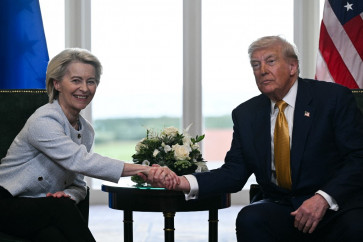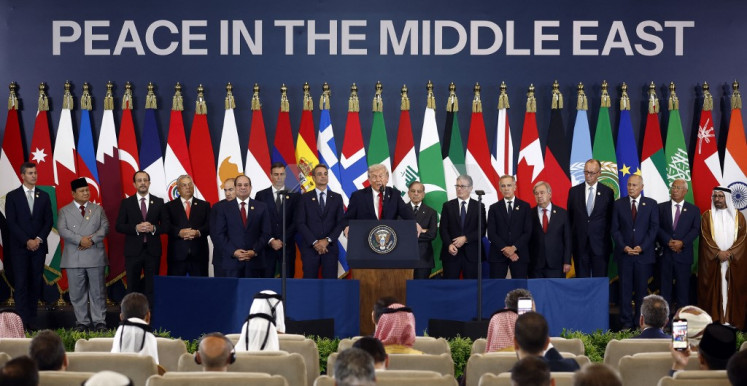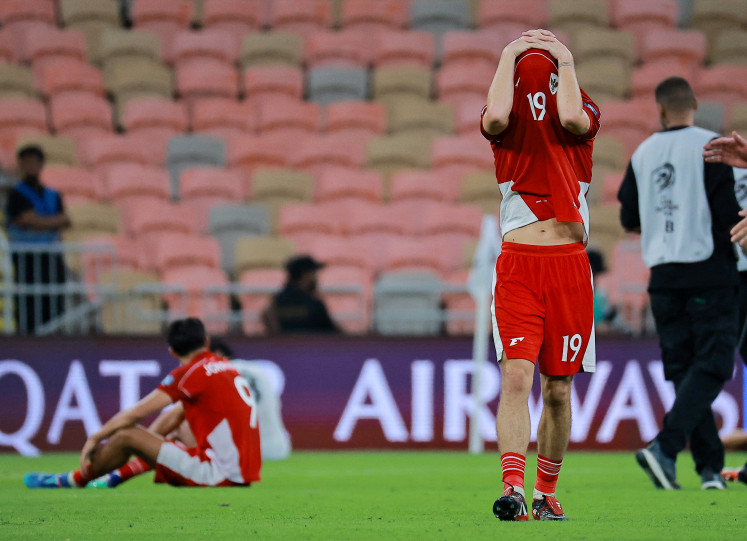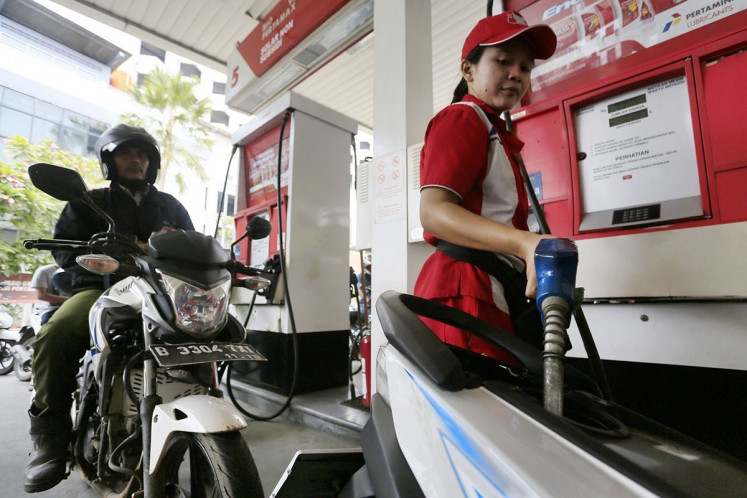Popular Reads
Top Results
Can't find what you're looking for?
View all search resultsPopular Reads
Top Results
Can't find what you're looking for?
View all search resultsSaudi handouts show prince bet on citizens after royal crackdown
Saudi Crown Prince Mohammed bin Salman’s high-speed U-turn on state handouts suggests he’s betting on the backing of ordinary citizens rather than traditional pillars of support as he consolidates power.
Change text size
Gift Premium Articles
to Anyone
S
audi Crown Prince Mohammed bin Salman’s high-speed U-turn on state handouts suggests he’s betting on the backing of ordinary citizens rather than traditional pillars of support as he consolidates power.
It took less than a week of Saudis grousing on social media and TV for authorities to announce they’d plow billions of riyals into people’s pockets to help offset government-initiated price increases. That sidestepped a mainstay of the prince’s plan to revamp the economy in part by weaning citizens off government largesse, indicating that consistency in fiscal policy isn’t his top priority right now.
During his swift rise to power, the kingdom’s 32-year-old de facto leader has swept aside rivals, arrested senior royals and billionaires -- including 11 princes detained on Thursday -- and defied the ultra-conservative religious establishment by letting women drive. That’s left him reliant on those Saudis eager for social change but struggling with austerity measures needed to achieve his vision of turning Saudi Arabia into a global investment hub no longer reliant on oil.
“The crown prince can’t afford to alienate his young constituency,” said Fawaz Gerges, a professor of international relations at the London School of Economics. “It’s not just about economic reforms. It’s also about the consolidation of the new leadership’s social base and the opposition from very entrenched interests by some members of the royal family.”
Grumbling
King Salman on Saturday ordered extra pay for Saudi government workers and soldiers this year after the Jan. 1 introduction of value-added taxation and a surge in fuel prices stirred grumbling among citizens. The cost to the state: more than 50 billion riyals ($13.3 billion), Saud Al-Qahtani, an adviser to the royal court, said on his Twitter account.
Saudis privately expressed mixed feelings about the about-face, with some overjoyed, and others finding it too stingy or worried about its limited duration. Some said the sudden swerve -- one of several since the prince announced his Vision 2030 blueprint for reordering the economy nearly two years ago -- made them question the government’s strategy.
Patriotic hashtags including, “We are all Salman, we are all Mohammed,” began trending on Twitter after the orders, and local newspapers praised the kingdom’s leadership.
The benchmark Tadawul All Share Index advanced 0.6 percent at the close in Riyadh, trailing markets in Kuwait and Qatar. The index was little changed in 2017, compared with a 34 percent gain for the MSCI Emerging Market Index.
Real Change
Paul Sullivan, a Middle East specialist at Georgetown University in Washington, saw a potential for unrest.
The prince’s base seems to be a younger generation who are “hoping for better lives and real change,” Sullivan said. “Hope is a great thing to give to people, but dashing it or giving a sense it really will not happen is a well-proven source of instability and anger.”
During times of past political uncertainty, Saudi Arabia’s autocratic leaders lavished handouts on their citizens. When the so-called Arab Spring uprisings were toppling long-entrenched leaders across the Middle East in 2011, then King Abdullah announced more than $100 billion for housing, soldiers and religious groups to prevent unrest from spreading into the Arab world’s largest economy.
What makes things different now is that Prince Mohammed has taken steps against other royals and their supporters in ways previous monarchs never did. In November, authorities swept up dozens of Saudi Arabia’s richest and most influential people, including princes and government ministers, accusing them of corruption. Critics accused him of trumping up allegations to sideline critics in a quest for one-man rule.
Eleven Princes
The anti-graft drive resonated with Saudis who are bearing the brunt of low oil prices and were complaining, privately and on social media, that the kingdom’s elite are allowed to act with impunity. The country’s attorney general tapped into that resentment Saturday when he warned that no one was above the law, including 11 princes arrested for protesting the state’s decision to stop paying their utility bills.
Pointedly, the princes were sent to the maximum-security al-Ha’er prison pending their trial -- and not the luxurious Ritz-Carlton Hotel that had housed many rounded up in the anti-corruption sweep.
The weekend largesse is just the latest manifestation of Prince Mohammed’s struggle to implement his proposed economic overhaul while avoiding popular discontent.
In 2016, the water minister was sacked following a public outcry over a surge in water prices, which came close on the heels of the government’s first round of subsidy cuts. The following year, the king reversed cuts to public sector benefits and allowances after complaints over the measures provoked calls on social media for street protests in several cities.
‘First Step’
Saudi economist Ihsan Bu-Hulaiga said he doesn’t see the new handouts as a “reversal” of government policy, but more of a fine-tuning. “Imagine yourself doing something for the first time,” he said. “It’s tricky. This is the first step. We’ll see how the economy will unfold.”
The government spent much of last year designing a program supposed to cushion the impact of fiscal reforms, a so-called Citizen’s Account. It gave low- and middle-income families monthly cash transfers to make up for the rise in prices. Saudis complained that they needed more.
Prince Mohammed is popular and has the support of the king, “but his popularity is very fragile because it’s built on expectations which are both significant and haven’t been managed,” said James Dorsey, a Middle East specialist at Singapore’s Nanyang Technological University.
“It’s unlikely that he will be able to fulfill those expectations within the timeline that people expects him to. Therefore he has to manage in order to maintain popularity,’’ Dorsey said.










